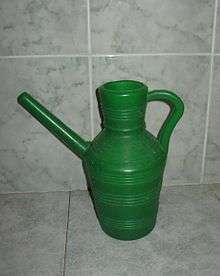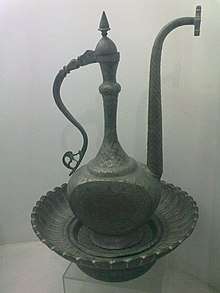Aftabeh (toilet pitcher)
Aftabeh (/ɑːftɑːˈbɛ/ Persian: آفتابه) is a pitcher made out of clay, copper, brass, or plastic which is used traditionally for purposes of hand washing, cleansing, and ablution.[1][2] Its overall shape is similar to a ewer with an angled spout protruding from its side, from where water is poured. It shares resemblance with lota and kindi in Indian culture.

Aftabeh is now mostly an accessory in Iranian toilets and used inside the bathroom alongside health faucets. Aftabeh has been used within Persia throughout history and many historical aftabehs are on display at museums around the world as historical artifacts with cultural and artistic value.[3]
Aftabeh-Lagan
In Qajar era, it was customary for affluent families to have servants bring a set of brass or copper aftabeh-lagan (pitcher and wash basin) so everyone could wash their hands and face before food was served. There is a famous Persian proverb associated with aftabeh-lagan: "7 sets of aftabeh-lagan, but no lunch or dinner!" which refers to an empty show of opulence around a subject where the actual content is missing.
References
- Alberts, Robert Charles (1983). Social Structure and Culture Change in an Iranian Village, Volume 1. University of Wisconsin. p. 169.
- "Squat toilet in Iran". Retrieved 18 March 2020.
- "oldest aftabeh dating 2600 years". Rokna News Agency. 18 March 2020.
External links
- An aftabeh in Brooklyn Museum
- A decorated brass aftabeh with Persian motifs at National Museum of Scotland
- Finely engraved Qajar-era aftabeh at State Hermitage Museum, Saint Petersburg, Russia
- Decorated brass aftabeh with poetic and benedictory inscriptions at Victoria and Albert (V&A) Museum, London
